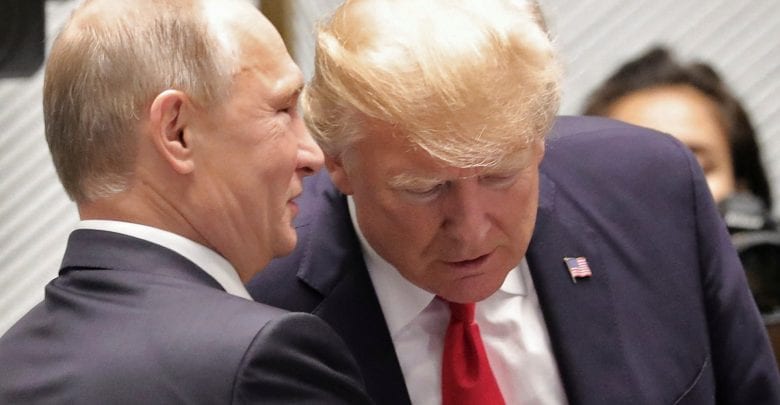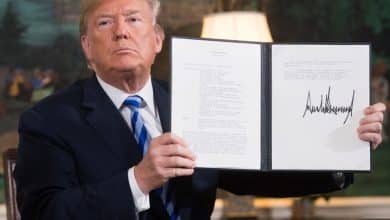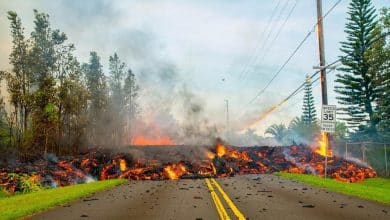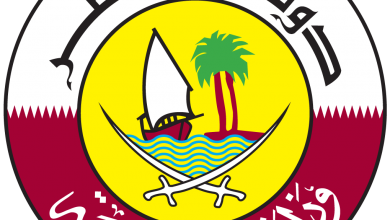
Trump’s ‘America first’ rhetoric is a gift to the Russian president
ترمب يمنح بوتن أعظم هدية سياسية في اجتماع فنلندا
When Donald Trump and Vladimir Putin meet in Helsinki on 16 July, there will only be one winner: it will be the guy who likes to be pictured shirtless riding horses in Siberia, not the one who trundles around a golf course in a cart. The biggest losers, of course, will be the rest of us, as the future prospects for international peace and prosperity take another nosedive.
Helsinki will be a miserable landmark, the first US-Russia summit conducted by nationalist populists. Both these men have been swinging massive wrecking balls at the rules-based global order. Trump cares nothing for the alliances and multilateralism that his predecessors worked to build after 1945. By summarily annexing Crimea in 2014, Putin unilaterally redrew borders through use of military force – a first in Europe since the second world war.
No wonder the US’s European allies are bracing themselves for another assault on the postwar settlement they are desperately trying to salvage: the continent’s security architecture, the European Union and liberal democracy. Trump will meet Putin just days after a Nato summit that everyone expects to be acrimonious, and a visit to Britain where large street protests will almost certainly have taken place. The visit to Helsinki allows him to seek some solace in the Kremlin with a like-minded “strong” leader.
Trump’s “America first” approach to world affairs is arguably the greatest political gift brought to Putin since he was told in 1999 by Boris Yeltsin’s entourage that he’d soon be stepping into the Kremlin to replace an ailing leader. The US’s withdrawal from Europe was a long-held Soviet goal that Putin now believes may be in reach.
If the extremist political forces Putin likes to promote in Europe do take over, with Trump helping to embolden them, the Russian president can begin to envision a new brand of transatlanticism, anchored in authoritarianism and white, Christian nationalism – a world view that would suit Putin down to the ground. The presence in the White House of a US leader who disparages allies, questions Nato, lashes out at Angela Merkel and says the “EU is possibly as bad as China, only smaller” when it comes to dealing with the US is quite simply a godsend.
In Helsinki, Putin will deploy the KGB toolkit he so readily absorbed back in his youthful years to run rings around Trump. Putin will have an easy time capitalising on Trump’s ignorance, vanity and complacency. And he will relish the fact that Trump in Helsinki will be as unpredictable to his own advisers as he generally is to US allies. “Do not congratulate,” said a briefing note handed to the US president after Putin’s re-election in March. Of course, he could not resist doing so.
The US president believes he is on a foreign policy roll. After his summit with the North Korean dictator, Trump believes he can blaze a trail again, this time in Europe. (No matter that the meeting in Singapore was first and foremost a big win for China, North Korea’s protector). What Europeans are most concerned about right now is that Trump may say he wants to put an end to military exercises with US allies. “A remake of the Korean summit is possible, with Trump possibly also mentioning US troop withdrawals from Europe,” says Tomáš Valášek, a former ambassador to Nato who heads the Carnegie Europe thinktank. “That’s the main worry of anyone you talk to at Nato.”
It’s hard to overstate what an unequal match the Helsinki get-together will be. Putin runs a tight power structure in Moscow, a militarist autocracy. Trump is in theory constrained by Congress (for example on Russia sanctions, which he can’t single-handedly unwind). Putin also has a long experience of US presidents trying to mend bilateral relations, only to discover later how much the Kremlin feeds on confrontation with the US for its domestic political narrative. Putin hardly needs the World Cup extravaganza to know he’s about to score big. He will seek to outmanoeuvre Trump with fake concessions such as empty promises to curtail Iran’s growing regional influence.
On Monday the White House said in a statement that the US “does not recognise Russia’s attempt to annex Crimea”. This oddly came across as an effort to curtail Trump’s worse instincts. But sceptics will have noticed the use of the present tense in that sentence. Never say never. When John Bolton, Trump’s national security adviser, sat down with Putin in Moscow last week to prepare the summit, a discreet woman was sitting next to him, taking notes. That was Fiona Hill, a brilliant Russia expert who joined the administration in 2017 and co-author in 2013 one of the best books about the Russian president’s personality and strategy, “Mr Putin, Operative in the Kremlin”. How much of that in-depth knowledge will have made its way to Trump? Putin will be confident the answer is: not much.
Russia is no longer a superpower. Its stagnating economy is the size of Italy’s; inequality is at a record high and there are rumblings of popular discontent as a result. Russia’s military budget is a fraction of that of the US. Smart, educated Russians are emigrating in droves, and capital flight is massive. But foreign ventures in Ukraine and the Middle East have helped Putin to compensate domestically for the failure to modernise his country. And the fact there will be a summit at all is a big win. There’s nothing Putin likes better than an event that creates the impression the US and Russia define world affairs as they once did during the cold war. Helsinki, with all its historical symbolism, will offer him just that.
Traditional Atlanticist Americans often say Trump doesn’t matter all that much when it comes to Russia, because the US has in fact doubled down on spending for Europe’s defence since he came to office. But the amount of hardware you deploy will count for little if a US president signals indifference or hostility to Europe, as is already the case. Likewise, people who say Putin has been demonised and that talking to him can only help to solve problems handily gloss over who Trump is and how oblivious he can be to the consequences of his own actions on the world stage. Talking to Putin in itself is not the issue, it’s what you say to him that counts. In Helsinki, Trump the narcissist will think he’s making history. Putin the operative will be secretly chuckling.
Natalie Nougayrède is a Guardian columnist
source: theguardian.com
اعتبرت الكاتبة الفرنسية ناتالي نوجايريدي أن خطاب الرئيس الأميركي دونالد ترمب -الذي يعتمد على مصالح «أميركا أولاً»- هو هدية للرئيس الروسي فلاديمير بوتن، الذي يريد استخدامه لتمزيق النظام السياسي القائم في أوروبا.
وأضافت الكاتبة -في مقال بصحيفة «جارديان» البريطانية- أن اللقاء الذي سيجمع بوتن بترمب في فنلندا بعد 10 أيام سيفرز فائزاً واحداً، هو رئيس روسيا، بينما سيكون أكبر الخاسرين هم الأوربيون، مع ازدياد اضمحلال فرص السلام والازدهار العالميين.
ورأت الكاتبة في قمة العاصمة الفنلندية، هلسنكي، قمة بائسة، ستجمع بين زعيمين شعبويين يمقتان النظام العالمي القائم على القواعد، إذ لا يبدي الرئيس الأميركي أي اهتمام بالتحالفات والتعددية التي عمل أسلافه على نسجها بعد الحرب العالمية الثانية، بينما رسم بوتن حدوداً جديدة لدولته، مستخدماً القوة العسكرية للمرة الأولى منذ عام 1945، لضم القرم الأوكرانية عام 2014.
وتقول الكاتبة إن ذلك هو سبب قلق حلفاء الولايات المتحدة في أوروبا، وتأهبهم لهجوم آخر على ترتيبات ما بعد الحرب العالمية الثانية، التي يحاولون الحفاظ عليها، مثل: الناتو، والاتحاد الأوروبي، والنظام الديمقراطي.
وتعتقد نوجايريدي أن سياسة ترمب التي تعتمد إعلاء مصالح بلاده فوق الشأن العالمي إنما هي أعظم هدية سياسية لبوتن منذ اعتلائه السلطة قبل 20 عاماً، فلقد مثّل انسحاب أميركا من أوروبا هدفاً طويل الأمد للاتحاد السوفيتي قبل انهياره، لكنه هدف يظن بوتن أنه ربما على التحقق.
ولفتت الكاتبة إلى أن جل ما يهتم بوتن به -رغم ضعف قوته الاقتصادية وهروب العقول المتعلمة من روسيا- هو خلق انطباع خلال قمة هلسنكي أن الولايات المتحدة وروسيا هما من يحددان الشؤون العالمية مجدداً، كما كان الوضع عليه خلال الحرب الباردة.
ورغم أن بوتن فشل في تحديث دولته، وإنماء الاقتصاد -تتابع الكاتبة- فإن مغامراته في أوكرانيا والشرق الأوسط غطت قليلاً على فشله داخلياً، كما تأتي القمة الأميركية- الروسية لتزيد ذلك الانطباع.;



